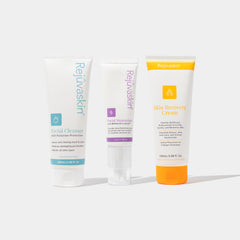Eczema on the face requires special care. Unlike eczema on the body, facial skin is thinner, more sensitive, and exposed to environmental stressors daily. Managing facial eczema effectively involves understanding its unique challenges and adopting a skincare routine tailored to soothe, hydrate, and protect this delicate area.
Why Facial Eczema Needs Specialized Care
Facial eczema can present with redness, dryness, and itching. The constant exposure to pollutants, temperature changes, and irritants like makeup can worsen symptoms. Many treatments designed for thicker body skin are too harsh for the face. Scientific studies show that barrier repair therapies and gentle formulations are key to treating eczema on the face (Puviani et al., 2014).
The Ideal Routine for Managing Facial Eczema
1. Start with a Gentle Cleanser
Using a mild, hydrating cleanser is essential to remove impurities without stripping the skin’s natural oils. Avoid harsh soaps or foaming cleansers that can dry out the skin. Barrier-protective cleansers help reduce symptoms and improve hydration (Weber et al., 2015).
- Rejûvaskin Hydrating Facial Cleanser: Formulated with Exo-P, this cleanser gently removes dirt while supporting the skin barrier, making it an ideal first step in your routine. Its soothing formula helps prevent flare-ups without irritation. Learn More.
2. Hydrate and Protect with a Rich Moisturizer
Keeping the skin moisturized is key to reducing dryness and reinforcing the skin barrier. Emollients with ceramides and natural soothing agents can reduce inflammation and maintain hydration (Puviani et al., 2014).
- Rejûvaskin Skin Recovery Cream: This cream is specifically designed for sensitive skin, featuring a blend of shea butter and aloe vera to calm inflammation and lock in moisture. Its non-irritating formula is perfect for daily use. Learn More.
3. Use a Sunscreen That Cares for Sensitive Skin
Sun exposure can worsen eczema symptoms, so wearing sunscreen daily is a must. Mineral-based sunscreens containing zinc oxide or titanium dioxide are recommended for sensitive skin as they provide broad-spectrum protection without irritation (Eichenfield et al., 2007).
- Rejûvaskin Mineral Facial Sunscreen: This gentle, zinc oxide-based sunscreen protects against harmful UV rays while being kind to eczema-prone skin. It’s lightweight, non-comedogenic, and doesn’t clog pores. Learn More.
Ingredients to Avoid
When managing facial eczema, it’s crucial to avoid common irritants:
- Fragrances: Can trigger flare-ups and allergic reactions.
- Alcohol: Often found in toners, alcohol can dry out the skin and worsen symptoms.
- Harsh exfoliants: Scrubbing the delicate facial skin can lead to micro-tears and increased irritation.
- Sodium lauryl sulfate (SLS): Found in many cleansers, SLS can strip the skin of natural oils and exacerbate dryness (Weber et al., 2015).
Additional Tips for Eczema Relief
- Keep It Cool: Avoid hot showers or harsh scrubbing, which can strip moisture and irritate sensitive skin. Opt for lukewarm water instead.
- Patch-Test New Products: Always test new skincare on a small area to ensure compatibility with your skin.
- Hydrate from Within: Drinking plenty of water and maintaining a balanced diet supports overall skin health.
- Avoid Overwashing: Limit cleansing to twice a day to preserve natural skin oils.
Why Choose Rejûvaskin for Eczema Care?
Rejûvaskin products are formulated with gentle, effective ingredients designed specifically for sensitive and eczema-prone skin. Backed by dermatological expertise, they provide safe, soothing, and hydrating solutions to help you manage facial eczema with confidence.
Works Cited
- Puviani, M., Agostinis, F., & Milani, M. (2014). Barrier repair therapy for facial atopic eczema with a non-steroidal emollient cream. Minerva Pediatrica. Retrieved from https://www.semanticscholar.org/paper/Barrier-repair-therapy-for-facial-atopic-eczema-a-A-Puviani-Agostinis/c2268f9f22848c47931d7fbf88d5aa81c6c9c082?utm_source=consensus
- Weber, T., Samarin, F. M., Babcock, M., Filbry, A., & Rippke, F. (2015). Steroid-free over-the-counter eczema skin care formulations. Journal of Drugs in Dermatology. Retrieved from https://www.semanticscholar.org/paper/Steroid-Free-Over-the-Counter-Eczema-Skin-Care-Risk-Weber-Samarin/a5db7e3fd9422ee4552c5d588eb106e17bbc704b?utm_source=consensus
- Eichenfield, L., et al. (2007). Clinical management of atopic eczema with pimecrolimus cream. Dermatology. https://pubmed.ncbi.nlm.nih.gov/18174689/





















Leave a comment